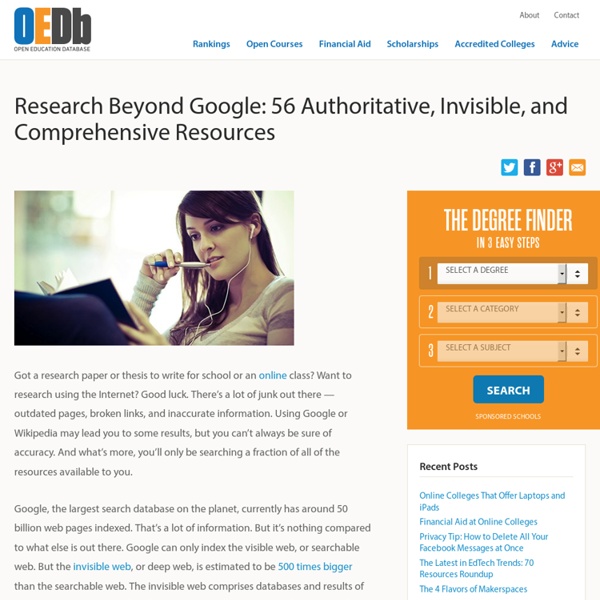Journey Into The Hidden Web: A Guide For New Researchers
Advertisement Table Of Contents 1. What is the Deep Web?
250+ Killer Digital Libraries and Archives
Hundreds of libraries and archives exist online, from university-supported sites to accredited online schools to individual efforts. Each one has something to offer to researchers, students, and teachers. This list contains over 250 libraries and archives that focus mainly on localized, regional, and U.S. history, but it also includes larger collections, eText and eBook repositories, and a short list of directories to help you continue your research efforts. death The sites listed here are mainly open access, which means that the digital formats are viewable and usable by the general public. So, such sites as the Connecticut Digital Library (iCONN) are not listed, as they operate on the premise that the user has a Connecticut library card in his or her possession. Efforts were made to go to the root source for these collections.
Deep Web Search Engines
Where to start a deep web search is easy. You hit Google.com and when you brick wall it, you go to scholar.google.com which is the academic database of Google. After you brick wall there, your true deep web search begins. You need to know something about your topic in order to choose the next tool. To be fair, some of these sites have improved their index-ability with Google and are now technically no longer Deep Web, rather kind-of-deep-web.
Meta Search Engine List
This page aims to provide a comprehensive list of meta search engines available across the world. A specialist meta-search engine for file extensions. Provides a search across many different file extension lists on the internet. If you need to know about a file extension then this is probably the best place to start. Monster crawler. Searches Google, Yahoo, Bing and Ask, as well as returning search results from sponsors.
The History of Visual Communication - The Masters of Typography
Download slideshow >>> The Renaissance is the term used to describe the development of Western civilization that marked the transition from medieval to modern times. In the 12th cent. a rediscovery of Greek and Roman literature occurred across Europe that eventually led to the development of the humanist movement in the 14th cent. In addition to emphasizing Greek and Latin scholarship, humanists believed that each individual had significance within society. The growth of an interest in humanism led to the changes in the arts and sciences that form common conceptions of the Renaissance. The 14th cent. through the 16th cent. was a period of economic flux in Europe; the most extensive changes took place in Italy.
99 Resources to Research & Mine the Invisible Web
College researchers often need more than Google and Wikipedia to get the job done. To find what you're looking for, it may be necessary to tap into the invisible web, the sites that don't get indexed by broad search engines. The following resources were designed to help you do just that, offering specialized search engines, directories, and more places to find the complex and obscure.
30 Specialist (and Super Smart) Search Engines
Google is widely (and rightly) recognised as the mother of all search engines. But, if you need to drill down your searches by more specific details, do you trust Google to give you what you need every single time? Here’s a collection of 3o vertical search engines which you should have up your sleeve when you need some specialist power. Flights / Travel 1. SkyScanner.net – The leading flights search engine, providing information about all carriers to help you find the best deal.
Brandieself added: 25 Sneaky Online Tools and Gadgets to Help You Spy on Your Competitors
Even before you entered into the world of “business”, you were watching your competition. Whether it was in a classroom or on a sports team, you not only wanted to keep up, you wanted to know where the marker was set so you could go one step further. It was about finding new opportunities and setting new goals based on someone you aspired to beat.
50 Best People Search Engines to Track Down Anyone
The Internet has a wealth of information, and not surprisingly, lots of that information is about people. You can find just about anything you want about someone online, including public records, addresses, and high school photos. If you’re looking up a long lost friend or family member, be sure to check out these resources. White Pages White pages are great for helping you find addresses and phone numbers for people.
100 Useful Tips and Tools to Research the Deep Web
By Alisa Miller Experts say that typical search engines like Yahoo! and Google only pick up about 1% of the information available on the Internet. The rest of that information is considered to be hidden in the deep web, also referred to as the invisible web.



